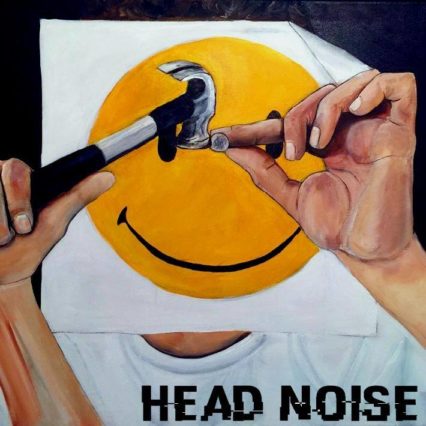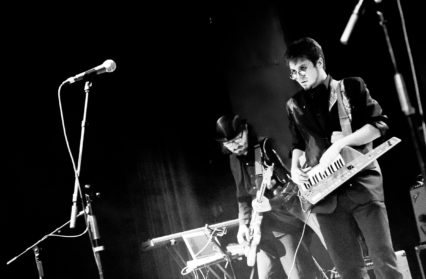Fresh from support slots with post-punk legends The Pop Group, The Nightingales, and John Otway, as well as indie high flyers Wolf Alice, Mitch Tennant, frontman with Aberdare’s Electro-Art Punks Head Noise met with Kevin McGrath to talk about the singer’s battle with debilitating illness and the band’s plans for 2018.
Keving McGrath: When and why did you form Head Noise?
Mitch Tennant: I’d played in various bands over the years but had developed a really bad case of tinnitus and I was at the point where I was afraid to make music because of how it might affect me further down the line. I went on a bit of a hiatus, but it was killing me not being able to make music. I was sat up in the bedroom with my ear muffs on playing acoustic guitar, strumming along to a drum machine. I was inspired by The Fall, by the simplicity of what they were doing, so I recorded a couple of demos and sent them off to a friend, a guitarist, for some feedback. I thought it was too obscure to play as a “normal” rock band so suggested that we debut it at my father’s upcoming surreal art exhibition in Merthyr, this was March 2016.
KM: Is the tinnitus still a major problem for you?
MT: I use fitted ear plugs now. Any musicians, or if you regularly go to see live music, you need to protect your ears.
 KM: Does your condition explain the band’s name?
KM: Does your condition explain the band’s name?
MT:I guess it goes without saying that the name Head Noise derived from this awful condition, but it was a dark time for me when we first started. I wanted to call the band ‘Snaggletooth’ originally, but later on I found out that it was the name of Motorhead’s mascot.
KM: What’s most important in a band mateship or musicianship?
MT: Definitely mateship, I’d say. You can make a terrible din with your friends, but as long as you’re enjoying it then it doesn’t matter!
KM: Tell us about the band members
MT: The band consists of Wayne Bassett on electric guitar & synths, Jordan Brill on electric guitar, bass & secondary synths and I dabble with bass guitar & keytar. We are three friends trying to make sense out of all the musical nuances that we’ve picked up together over the years. Our first gig together was described as David Lynch meets the Pet Shop Boys. I like that.
KM: What was the first record you bought as a responsible adult?
MT: I went through a phase, when I was younger, of listening to a lot of comedy records – The Goons, Monty Python, Spike Jones and the City Slickers, but I wouldn’t consider that as my first musical experience. I’d say the first record I bought, knowingly and willingly, was Never Mind the Bollocks. Obvious choice, but when you’re young and you hear about this band that breaks all the rules and causes a ruckus you just want to see what it’s all about and understand. As soon as you put that record on it opens your mind to the beautiful world of punk music and everything that comes with it.
KM: Elvis or Iggy?
MT: Iggy. I don’t think Elvis could shit behind an amp and get away with it!
KM: Which is the most overrated band in the history of pop music?
MT: I’ve got a list! I love Pink Floyd, I love all the early stuff with Syd Barrett, I love some of the later stuff. I really grew up with Pink Floyd, but I’d still say that they are the most overrated band in the world.
KM: What’s the division of labour, as far as songwriting goes, within the band?
MT: When we first started, one of us would write a song and pass it on to the band. Now, Wayne writes the main bulk of the music, I put the lyrics to it and add the weird keyboard sounds, the Theremin or any instrument that I can get my hands on. Brill comes in at the end and tightens it all up.
KM: You’ve played some intriguing support slots lately – everyone from post-punk legends The Nightingales to Indie high flyer’s Wolf Alice. That last gig, in particular, must have tested your metal. How did Wolf Alice’s fans’ take to you?
MT: We were kind of worried how they would take to us, but they were clapping, singing along and dancing. It was a nerve-racking experience, but it was fantastic and I can’t thank the audience enough.
KM: For those of us who have never practiced air keytar in our bedrooms, explain the fatal attraction of the keytar to an innocent youth from the valleys who may be tempted in that direction?
MT: I’ve always stuck with the fact that I’m not a musician, I’m an entertainer. I don’t know what that means, exactly. I know that you don’t need to be very skilled to be able play an instrument. When I would see someone holding a keytar, like someone from Yes or Peter Gabriel’s backing band it looked so complicated, but you can keep it simple. That’s where The Fall steps in, again. An instrument like that always stands out as something different and strange. I picked it up for a pound in a charity shop!
KM: If you could time travel to any point in the history of popular music, whether it be the jazz age or Greenwich Village folk scene, for example, which period would you set the Head Noise time machine co-ordinates for?
MT: I’d love to go to Sheffield, just before the Human League started making Reproduction (1979). They were inspired by Kraftwerk, experimenting with that sort of electric sound, but still had that band aesthetic, like a punk band.
KM: A number of your songs read like science fiction or horror stories. Is Head Noise influenced by art forms other than music?
MT: I’m really into Czechoslovakian and Soviet animation. I love Jan Švankmajer’s work. I’ve always been into abstract art, surrealism, that’s my sort of thing. Wayne’s into Sci-Fi – from Barbarella (1968) to Interstellar (2014), and we all love our B-movies, like Ed Wood’s Plan 9 from Outer Space (1959).
KM: Does that feed into anything specific in terms of lyrics or staging?
MT: We’ve got a song “The Man with a Rubber Head”, a Fall sort of name, but it’s actually about George Méliès, the French director from the turn of the 20thcentury who made Le Voyage dans la Lune (1902). It’s done in a tongue in cheek way, but it was the DIY aspect that inspired me. Méliès was experimenting and using his own methods, it’s nice to bounce off an unintentional inspiration. I’m really into the performance element of watching a live band. Not so much over the top theatrics, but as an artist I believe that you should try your hardest to put on a show, no matter how unusual it may be. It projects a little slice of your own unique world to the observer. The record sleeve for our latest mini-album was painted by my father Will Tennant and I think it is the right image to sum up the name of the band and what to expect. A cheeky grin, but also the fear of a nail being hammered into the forehead!
KM: Where, in my record collection, should I file Head Noise’s Mini-LP Special Effects Improves the Defects?
MT: You can chuck us next to Devo, David Devant, Human League, Sparks, or Landscape
KM: The lyrics to tracks like “Kingpin” and “The Meat People” seem to fixate on Zombies. Is there something about the good folk of Aberdare that we should know? In other words, if I’m going for a pint in the Glancynon should I take a pitchfork?
MT: I think your surroundings play a big part in the music you make. What’s around me, in my neighbourhood, does help create the mythos of the band, even if some of the songs have nothing to do with the area. “Kingpin” is directly influenced by Warren Beatty’s Dick Tracy (1990). But you can interpret the music anyway you like and I’m glad people do.
KM: What are your plans for 2018? Is there an album release set for 2018?
MT: We keep creating content and if people want to pick up on that, that’s great. We’re four songs into a twelve song debut album. It’s our version of Primal Scream’s Exterminator –half punk / half electronic that we’ve smashed together. I like to work quickly, so I think we’ll have it done by August.
KM: Are you producing it yourself?
MT: Yes, from our guitarist’s spare bedroom. That’s the beauty of the drum machine!
Kevin McGrath: Are you planning to play more gigs outside of Wales?
Mitch Tennant: Yes, the next one we have planned is In Bradford-on-Avon in July. When you’re playing to a complete new audience, one that doesn’t know anything about what you do, I think it’s refreshing and you test yourself as well. I just don’t want to slow down, my hearing may be going, but my passion definitely isn’t.
Head Noise’s new EP Consequential Quasars! is out now.
Recommended for you…
Matt Taylor reviews Culture Violet, the debut solo album from XY&O’s lead vocalist, Skip Curtis, which sees the artist take a step towards a traditional indie sound.












